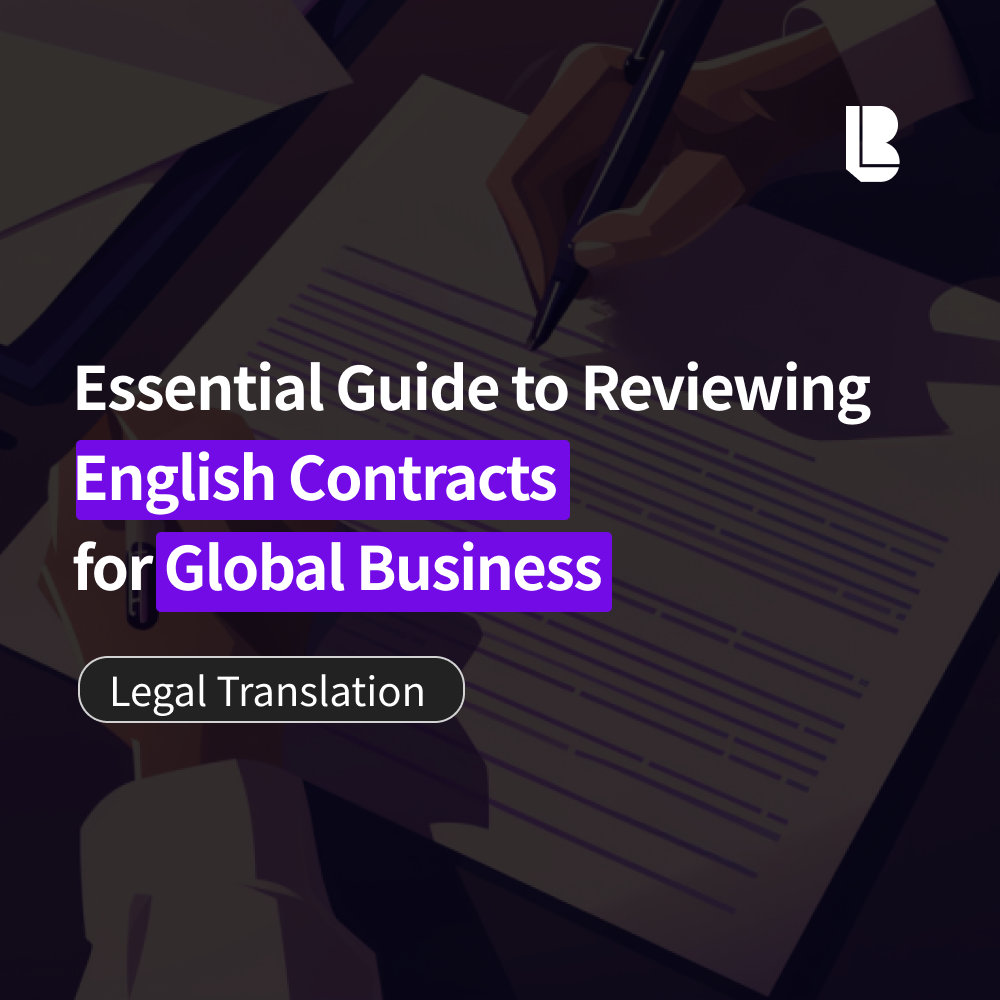Hello from Bering Lab! These days, it’s common to see companies of all sizes expanding beyond Korea and entering the global market. It’s impressive and makes us proud to see such progress. However, with global expansion comes a critical requirement: reviewing English contracts.
Do you think it’s just about translating Korean contracts into English? It’s not that simple.
An English contract is a legally binding document. Even a slight change in the meaning of a word or sentence can cause significant problems. Without a proper review, you could find yourself in legal disputes. A small mistake in the contract could lead to substantial financial damage or, in the worst case, even the closure of your business.
But don’t worry! You can avoid these risks by having your contracts carefully reviewed by experts. It’s important to have not just someone fluent in English, but someone who understands legal terminology and international regulations. Let’s explore why English contracts have become essential and how you can effectively review them.
✍🏻 Why are English contracts necessary?

First, contracts are necessary to clarify agreements and build trust when dealing with foreign partners. This is especially important when different cultures and languages are involved. To succeed in the global market, you must start with a strong English contract.
Second, they are crucial for legal protection. Unexpected issues can arise in international transactions, and the contract acts as a shield. A well-drafted contract has legal force and makes it easier to resolve disputes. Therefore, it’s important to have a professional draft the contract when dealing internationally.
Lastly, contracts help ensure compliance with local laws. What may be legal in one country might be illegal in another. That’s why it’s important to consult with experts who are familiar with the legal systems of other countries. Properly adhering to local regulations helps protect your business and maintain its reputation in the local industry.
Even though contracts are crucial, navigating contracts written in a foreign language can be tricky. Without realizing it, you could agree to unfavorable terms or overlook key legal provisions. Let’s now look at how to carefully review English contracts and avoid these risks.
✍🏻 Guide to Reviewing English Contracts

The first thing to check are the key clauses. One of the most important is the termination clause. This outlines the conditions under which the contract can be ended. Watch out for phrases like “termination without cause,” which could allow the other party to terminate the contract at any time. You should also pay close attention to the damages clause, which defines compensation for contract breaches, and the term of the contract, including its duration and any automatic renewal conditions.
Next, you need to understand the structure and terminology of the contract. English contracts typically follow a standard structure, covering the purpose of the contract, the rights and obligations of the parties, the duration, and the conditions for termination. Knowing this structure will make it easier to read the contract.
Understanding key terms is also essential. For example, “shall” and “may” might seem similar, but “shall” imposes a legal obligation, while “may” is permissive. Understanding such distinctions can help you accurately interpret the contract. If you need help with contract terminology, check out our “Legal Tips for Reviewing English Contracts” series at Bering Lab.
Lastly, don’t overlook any attached documents such as “Exhibits,” “Attachments,” or “Schedules.” These documents are legally part of the contract and often contain important information like technical specifications or pricing details.
✍🏻 Need Professional Review for Contract Drafting and Translation?
Drafting, translating, and reviewing an English contract isn’t easy. However, with advancements in AI technology, the process is becoming faster and more efficient. AI translation tools can draft preliminary translations of long documents in seconds, saving you time. While AI translation used to be awkward and inaccurate, it has improved significantly in recent years. However, it still has limitations, especially when dealing with legal terminology and complex sentence structures.
That’s where human review by legal professionals comes in. Legal experts can catch subtle nuances that AI might miss. For example, how you interpret a word like “shall” can dramatically change the meaning of a contract. Lawyers ensure not only translation accuracy but also legal enforceability.
Let us introduce you to BeringAI+. This service combines the speed of AI translation with the expertise of professional lawyers. AI creates a quick draft, and a legal expert carefully reviews it, providing a cost-effective solution. BeringAI+ is specialized in legal and business translations, ensuring you receive the highest quality review.
As we discussed, thoroughly reviewing and accurately translating an English contract is essential for preventing and resolving legal disputes. With expert help, you can avoid vague wording or mistranslations that might cause problems.
BeringAI+ makes handling important contract work easier and more efficient. By combining the speed of AI translation with legal expert review, it ensures fast, accurate translations. On top of that, we are currently offering a special promotion. New corporate customers can receive up to a 40% discount on document translations such as Terms and Conditions, Bylaws, and Privacy Policies. You’ll get 30% off for one document, and 40% off for two or more, with simultaneous translations available in over 30 languages.
If you’re expanding internationally and worried about English contracts, BeringAI+ provides both expertise and efficiency to make your global business safer and more successful. Visit Bering Lab today to get a quote. We look forward to supporting your success!

